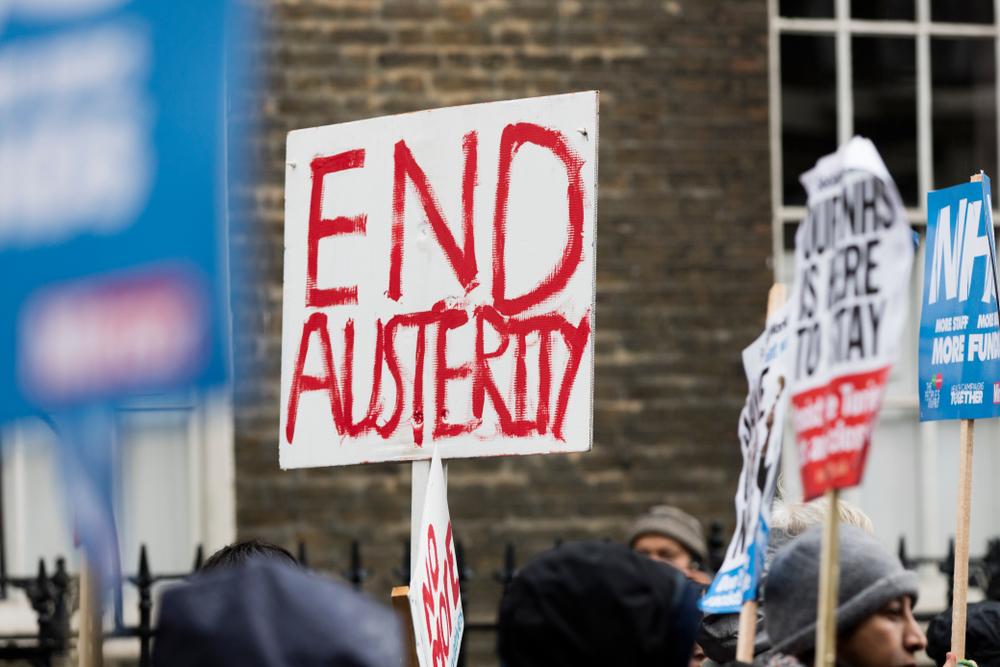Prime minister Theresa May has once again faced a day of little solace, with her pragmatic approach to political struggles making for an amenable speech last week, but doing little to tackle the macro-political dilemmas that have proliferated her time in office. Aside from struggling to cater to all parties in drawn-out Brexit negotiations, the prime minister suffered today during PMQs due to a self-prescribed ailment – the promise to end austerity.
This issue presents a trifecta of challenges. Firstly, can the political agenda really afford to take on this kind of burden amidst the Brexit negotiations? Secondly, in a time of financial uncertainty, can the Tory party realistically hope to end fiscal retrenchment in a time when their greatest claim to electoral legitimacy is their stake as the party of fiscal responsibility? Thirdly, the £35-40 billion per year ballpark figure will merely mitigate the need for cuts to public services in the near future, and will do little to reverse the past measures of austerity, such as the hike in tuition fees or the challenge of achieving parity between mental and physical healthcare services.
On the latter issue, concerted effort and meaningful action is required, not symbolic actions or political euphemism. Secretary of State for Health and Social Care, Matt Hancock, has admitted that mental health services are failing six years after a commitment was made to improve the standard and provision of care. Similarly, the SNP Leader in Commons, Ian Blackford, pointed to a piece of research that indicated that one-in-two women taking part in the ‘work capability programme’ -introduced by the Tory party – had considered suicide. Incidentally, there is a double-edged sword. The Conservative party have failed to deliver on their promise to improve mental health services, and the combination of cuts to welfare and compulsory work skills workshops have if anything exacerbated the pre-existing problem.
In response, May says that efforts will be made to give the sector “the attention it needs”, she announces a new Minister for Suicide Prevention and then notes that the work capability programme was introduced by a previous Tory government, not hers.
With that kind of lacklustre response, it is perhaps little surprise that the public and the prime minister’s Commons opposition are both highly sceptical about how and when the promise to end austerity will come into fruition.
In response, opposition leader Jeremy Corbyn questioned, “The prime minister declared she is ending austerity. But unless the budget halts the cuts, increases funding to public services, gives our public servants a decent pay rise, then isn’t the claim that austerity is over simply a great big Conservative con?”
In rebuttal, the prime minister stated, “I’ve been very clear that there are better times ahead for people, we will see debt falling and we will see support for our public services going up. Austerity is being brought to an end. What is not being brought to an end is fiscal responsibility.”
So, without making any concrete commitments during today’s PMQs – other than continuing the fuel duty freeze – the prime minister was challenged again by Corbyn. The Labour leader asked when the public could expect to see the return of some of the 5,000 mental health nurses cut since 2010, or when tuition fees would be frozen, when benefits for large families would stop being cut and when would pension and pay for public servants would stop being chopped into by cuts? He continued by asking if austerity is over, why then is the police federation taking the government to court over issues of funding? And why has the Education Secretary been rebuked four times by the statistics watchdog this year if austerity is over for teachers?
In response, May said that fiscal responsibility is still of paramount importance, education spending is at a record high and that Conservative terms in office since 2010 were left with the thankless task of having to revamp the economy in the wake of the crisis presided over by Labour.
Overall, many could envisage this kind of point-scoring ping-pong continuing in the chamber for eternity – even outside of PMQs. But while the prime minister could be right about the costly nature of Corbyn’s proposed policy package, the general public’s immediate concern will be focused on whether May will fulfil the promises she made during her party conference speech last week.




